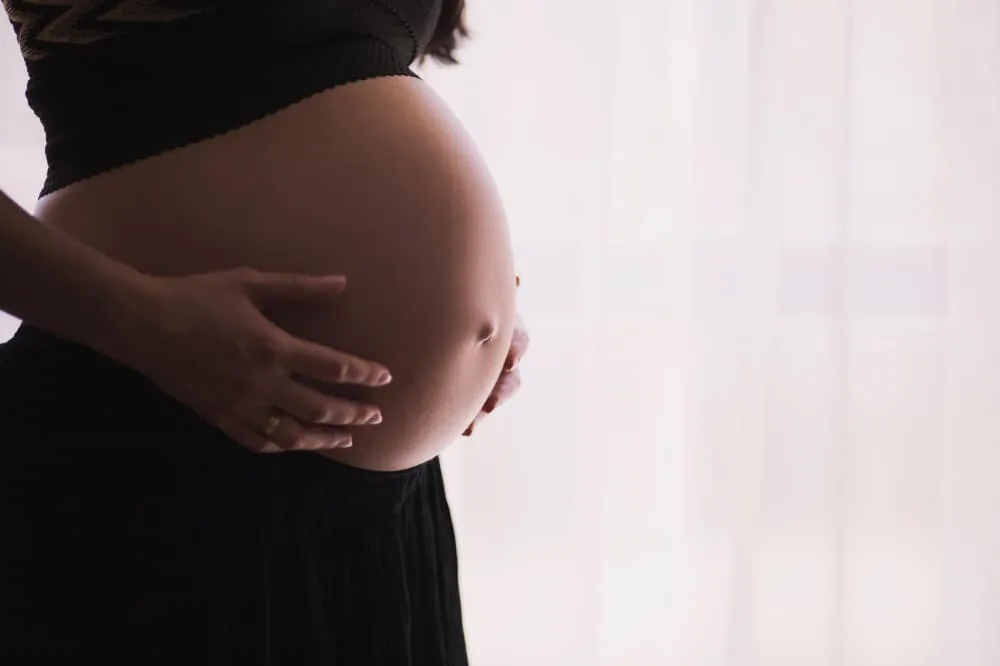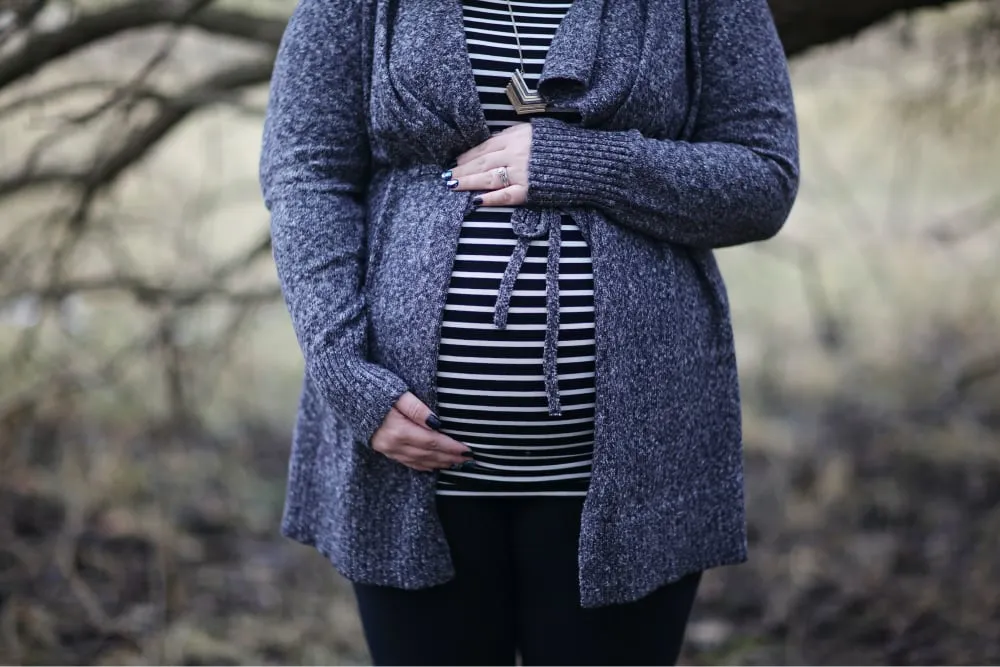What is "Pregorexia"?
“Pregorexia” is not officially defined in the Diagnostic and Statistical Manual of Mental Disorders (DSM-5), but it's widely recognized by medical experts.
Generally, the name refers to a condition where pregnant women attempt to restrict calories and/or increase physical activity to counteract the physical changes involved with pregnancy.7 It can also stand in as shorthand for struggling with any kind of eating disorder or disordered eating behaviors while pregnant.
While pregorexia has only recently been scientifically recognized, and studies on the condition are ongoing, experts emphasize that both pregnancy and postpartum are especially vulnerable periods for women, when eating disorders can either develop or become worse. They're also danger periods for relapse for women who have previously struggled with eating disorders.7
Most women likely experience at least some body image concerns while pregnant, as the physical changes involved can be drastic and uncomfortable. But someone with pregorexia will show additional concerning signs and symptoms.
Signs of pregorexia
A combination of “pregnant” and “anorexia,” pregorexia can refer to anorexia in pregnancy, but it's usually understood as a broad term, referring to any type of disordered eating behaviors while pregnant. As such, the condition can manifest as any number of signs or symptoms.
Officially, “signs” of any disorder refer to the effects that can be outwardly observed, whether by a medical test or the observation of doctors, friends, or family. Because it combines two evident conditions—eating disorders and pregnancy—pregorexia has many outwardly detectable signs.
Physical signs of pregorexia
Restricting food intake
Restricting food intake is a classic sign of many eating disorders, and it can also be a tell-tale sign of pregorexia.
When the condition was first brought to light, in a 2004 report for New York Magazine, a poll found as many as 21% of respondents engaging in “weight-restrictive” behavior while pregnant, including limiting food intake. This restrictive behavior wasn't on medical advice, but was done in an attempt to limit pregnancy weight gain.1
Pregnant women need to consume more calories in order to facilitate the growth of a fetus and keep their own bodies healthy during this physically demanding time. Restricting calories can be hugely detrimental to both mother and baby.
Purging
Many women naturally experience nausea, referred to as morning sickness, during pregnancy, especially during the first trimester. But women struggling with pregorexia may also purge on purpose.
While no statistics or studies have officially connected the two behaviors, intentional purging while pregnant was also anecdotally reported in the 2004 story.1 And experts have noted that a history of eating disorders could lead to disordered eating while pregnant.
2That means unhealthy behaviors experienced as part of
bulimia nervosa or purging type anorexia nervosa, which both involve purging as an attempt to control weight, could be carried into pregnancy.
Little/no weight gain while pregnant
A big sign of pregorexia is not gaining enough weight while pregnant.
Official weight gain recommendations are extremely personal and dependent on a number of individual factors, but it’s crucial for all women to gain at least some weight while pregnant. Yet, according to a 2003 study, more than 30% of pregnant women came in under their recommended weight target.3
This doesn’t mean all these women struggled with pregorexia. There can be many reasons why a woman may have trouble putting on weight while pregnant. But when it's done intentionally in response to stress over changing body shape or perceived body image, it may be a sign of pregorexia.
Emotional and behavioral signs of pregorexia
Compulsive calorie counting
Many women have reported the urge to control calories as a reaction to weight gain in early pregnancy.1,2 And compulsive calorie counting can be a sign of pregorexia.
The behavior can hint at a fixation with calories and nutritional information, for reasons other than health. "Calorie counting" can include focusing on calories in individual foods or meals, or staying within a certain limit each day.
Excessive exercise routines
Exercising can be beneficial for pregnant women. But
extreme exercising can be harmful to both the mother and the unborn baby. Not gaining enough weight during pregnancy increases the risk of a premature birth and the many complications that can result.
6 Over-exercising can also lead to other issues.
An excessive workout routine while pregnant could look like an unwillingness to modify or give up previous, more rigorous routines.5 It could also manifest as women exercising to the point of exhaustion, or exercising every day, regardless of how they feel.
Eating alone
Eating alone is a sign of many eating disorders, including
binge eating disorder, bulimia nervosa, and anorexia nervosa. Developing this type of secretive eating behavior often signifies a number of anxieties around food and physical appearance. This is likely also the case with someone who has an eating disorder while pregnant, though much more clinical research on the subject is needed.
Eating alone
Doctor’s appointments are extremely important throughout pregnancy, as they track both the baby's and the mother’s growth and well-being.
But many women with pregorexia may avoid their doctor’s appointments or have excessive anxiety about going, for several reasons.5 In anecdotal research, some women reported feeling “triggered” by getting weighed at these appointments.2 Additionally, some emotional symptoms of pregorexia may also be at play (see below).
Symptoms of pregorexia
Observable signs of a condition indicate that something may be wrong. Symptoms of a condition are equally important to note, but may not be noticeable to another person. Only the person experiencing them can feel or report symptoms.
Physical pregorexia symptoms
Chronic fatigue
Chronic fatigue can occur for any number of reasons and is a common experience in both pregnancy and eating disorders. But it can also be a pregorexia symptom.5
For someone who's pregnant, chronic fatigue may result not just from the physical and hormonal changes going on, but from specific behaviors related to their eating disorder, such as excessive exercise, an unbalanced diet, or limited nutritional intake.
Dizziness/mental fuzziness
Dizziness, mental fuzziness, and even blackouts are other symptoms common to both pregnancy and many eating disorders. This pregorexia symptom is usually tied to low electrolyte levels and dehydration, which can be sparked by disordered eating behaviors and many purging behaviors.5
Gastrointestinal discomfort
Pregnant women often experience gastrointestinal issues or discomfort, especially as the unborn baby grows. But many disordered eating behaviors have also been tied to ongoing or complicating digestive issues. Specific pregorexia symptoms related to gastric distress could include bloating, gas, acid reflux, and constipation.
Emotional and behavioral pregorexia symptoms
Shame or guilt about weight gain
Perhaps the most commonly-cited emotional symptom of pregorexia is the shame and guilt associated with gaining weight during pregnancy. This generally happens despite having an understanding that weight gain is natural and even necessary during this time.1,2
This pregorexia symptom can drive many of the condition’s disordered behaviors. Yet, it's likely that many women experience certain feelings about their changing bodies during this time, which is part of what makes pregnancy and postpartum such vulnerable periods for developing disordered eating behavior.
Preoccupation with weight
Another common pregorexia symptom is an overall preoccupation with weight during pregnancy.5
When outwardly presented, this could look like regularly weighing oneself, regularly speaking about food, calories, or weight, or even frequently checking in the mirror (or avoiding mirrors).
Someone who's pregnant may also compare their weight or body shape to others, or talk about how much they wish they weighed, or how much they used to weigh. When the subject becomes common in their day-to-day life, it could signify something deeper going on.
Feeling “disconnected” from pregnancy
Another troubling pregorexia symptom is a feeling of detachment from either the experience of being pregnant or the growing baby inside.5,2,1
This means women may not acknowledge their pregnancy often or at all, may not express joy or other positive sentiments about their situation, or may even skip doctor’s appointments. This could be due to feelings of anxiety or depression as their bodies grow bigger to accommodate the growing baby.
Obsession with “healthy” eating
Pregorexia can also be experienced as
orthorexia nervosa, or an unhealthy fixation on "healthy" eating. In these cases, pregnant women are overly concerned about the health or “purity” of their diet, fixating on eating only the healthiest, “most appropriate,” “clean,” or organic foods possible. They may also be obsessive about meal routines and eating habits.
Many people struggling with orthorexia nervosa have the best intentions when it comes to eating. But the condition can quickly spiral, leading to overly-rigid rules and routines surrounding food—and a lot of stress when they’re breached. Orthorexia nervosa can also lead to a highly restrictive diet, similar to anorexia nervosa. Pregnant women can face additional concerns when this happens, due to nutritional deficiencies that may be especially dangerous for them and the developing fetus.
Pregnancy needs vs. pregorexia
Growing a healthy baby is a complex process that can be complicated by a number of factors. And when it comes to struggling with an eating disorder, pregnancy can be even more dangerous, for both mother and baby.
The dietary and exercise needs of pregnant women are different than those who aren't pregnant, but can be especially far from what people struggling with pregorexia experience. Checking your or your loved one’s daily behaviors against these recommendations can be another way to understand whether someone is struggling with pregorexia.
Dietary needs
According to the Food and Drug Administration (FDA), pregnant women should eat a well-rounded, balanced diet, consisting of:8
- A variety of vegetables, including dark green, red, orange, and starchy vegetables
- Legumes (beans and peas)
- Oils
- Fruits, especially whole fruits
- A variety of proteins
- Fat-free or low-fat dairy products
- A variety of grains, at least half of which should be whole grains
Proper nutrition is especially important while pregnant. Without enough nutrients and calories to nourish the body at this time, there’s a higher risk for low birth weight, which can result in problems that include difficulty in breastfeeding, an increased risk for illness, and developmental delays.4
Someone struggling with an eating disorder while pregnant may dismiss some of these foods or entire food groups, out of concern over how it may impact their weight.
Exercise/movement needs
Exercise is another behavior that many pregnant women who struggle with an eating disorder may use to control or even lose weight. Pregnant women need to exercise and move their bodies, but excessive exercise can be dangerous.
According to the Centers for Disease Control (CDC), pregnant women should strive for around 150 minutes (or 30 minutes, 5 days per week) of moderate aerobic activity. (9) Some recommended movements include:9
- Some forms of yoga
- Brisk walking
- Bike riding
- Water aerobics
How much exercise to do while pregnant should be evaluated by the mother and doctor, and the recommendation depends on several individual factors. In general, exercise during pregnancy can have several benefits, but overdoing it can become dangerous for mother or child.
Eating disorders and pregnancy: When to get help
Weight gain is natural during pregnancy and essential to support the health of an expectant mother and her unborn baby. But for many, this process can feel uncomfortable, and for some, it can potentially trigger disordered thoughts and behaviors.
If you or a loved one is struggling to gain weight while pregnant due to fears about body weight or body image, or otherwise struggling with unhealthy relationships with food and eating at this time, you may want to talk to your doctor about your concerns. In any case, it’s vital to seek out treatment.
You can also look into options for virtual eating disorder care. Finding compassionate care from treatment providers for eating disorders like pregorexia can be challenging, but we are here to help.
Help is within reach
At Within, our clinical care team has created a revolutionary virtual treatment program for anyone with an eating disorder. Our team will help build a program tailored to your needs and provide you with support throughout your treatment and recovery. If you’d like to learn more about our virtual care program for pregorexia, call our admissions team now.
Call us today 







